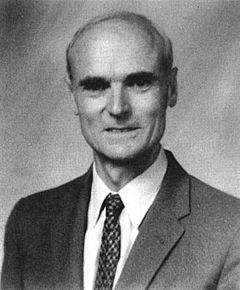- Harold Scott MacDonald Coxeter
-
H. S. M. "Donald" Coxeter 
Born February 9, 1907
London, EnglandDied March 31, 2003 (aged 96)
Toronto, Ontario, CanadaResidence Toronto, Ontario, Canada Fields Geometry Institutions University of Toronto Doctoral advisor H. F. Baker[1] Notable awards CRM-Fields-PIMS prize, 1995 Spouse Hendrina, died in 1999 Harold Scott MacDonald "Donald" Coxeter, CC (February 9, 1907 – March 31, 2003)[2] was a British-born Canadian geometer. Coxeter is regarded as one of the great geometers of the 20th century. He was born in London but spent most of his life in Canada.
Contents
Biography
In his youth, Coxeter composed music and was an accomplished pianist at the age of 10.[3] He felt that mathematics and music were intimately related, outlining his ideas in a 1962 article on "Mathematics and Music" in the Canadian Music Journal.[3]
He worked for 60 years at the University of Toronto and published twelve books. He was most noted for his work on regular polytopes and higher-dimensional geometries. He was a champion of the classical approach to geometry, in a period when the tendency was to approach geometry more and more via algebra.
Coxeter went up to Trinity College, Cambridge in 1926 to read mathematics. There he earned his BA in 1928, and his doctorate in 1931. [3] [4] In 1932 he went to Princeton University for a year as a Rockefeller Fellow, where he worked with Hermann Weyl, Oswald Veblen, and Solomon Lefschetz.[4] Returning to Trinity for a year, he attended Ludwig Wittgenstein's seminars on the philosophy of mathematics.[3] In 1934 he spent a further year at Princeton as a Procter Fellow.[4]
In 1936 Coxeter moved to the University of Toronto, becoming a professor in 1948. He was elected a Fellow of the Royal Society of Canada in 1948 and a Fellow of the Royal Society in 1950. He met Maurits Escher and his work on geometric figures helped inspire some of Escher's works, particularly the Circle Limit series based on hyperbolic tessellations. He also inspired some of the innovations of Buckminster Fuller.
Coxeter, M. S. Longuet-Higgins and J. C. P. Miller were the first to publish the full list of uniform polyhedra (1954).
Since 1978, the Canadian Mathematical Society have awarded the Coxeter–James Prize in his honor.
In 1990, he became a Foreign Member of the American Academy of Arts and Sciences. In 1997 he received Sylvester Medal from the Royal Society and was made a Companion of the Order of Canada.[5]
Works
- Coxeter, Longuet-Higgins, Miller, Uniform polyhedra, Phil. Trans. 1954, 246 A, 401–450.
- The Real Projective Plane (1949)
- Introduction to Geometry (1961)
- Regular Polytopes (1963), Macmillian Company
- Regular Polytopes, (3rd edition, 1973), Dover edition, ISBN 0-486-61480-8
- Non-Euclidean Geometry (1965)
- Geometry Revisited (with S. L. Greitzer, 1967)
- Projective Geometry (2nd edition, 1974)
- Regular Complex Polytopes (1974), Cambridge University Press
- The Beauty of Geometry: Twelve Essays (1999), Dover Publications, LCCN 99-35678, ISBN 0-486-40919-8
- The Fifty-Nine Icosahedra (with P. Du Val, H. T. Flather, J. F. Petrie)
- Mathematical Recreations and Essays (with W. W. Rouse Ball)
- Twisted honeycombs (American Mathematical Society, 1970, Regional conference series in mathematics Number 4, ISBN 0-8218-1653-5)
- F. Arthur Sherk, Peter McMullen, Anthony C. Thompson and Asia Ivić Weiss, editors: Kaleidoscopes — Selected Writings of H.S.M. Coxeter. John Wiley, 1995, ISBN 0-471-01003-0
- Coxeter, H. S. M. and Moser, W. O. J. (1980). Generators and Relations for Discrete Groups. New York: Springer-Verlag. ISBN 0-387-09212-9.
Bibliography
- Chandler Davis and Erich W. Ellers, editors: The Coxeter Legacy: Reflections and Projections. American Mathematical Society, 2006, ISBN 0-8218-3722-2
See also
- Boerdijk–Coxeter helix
- Coxeter functor
- Coxeter group
- Coxeter number
- Coxeter–Dynkin diagram
- Coxeter–James Prize
- Coxeter–Todd lattice
- Coxeter's loxodromic sequence of tangent circles
- LCF notation
- Todd–Coxeter algorithm
- Tutte–Coxeter graph
References
- ^ Harold Scott MacDonald Coxeter at the Mathematics Genealogy Project.
- ^ Roberts, S.; Ivic Weiss, A. (2006). "Harold Scott MacDonald Coxeter. 9 February 1907 -- 31 March 2003: Elected FRS 1950". Biographical Memoirs of Fellows of the Royal Society 52: 45. doi:10.1098/rsbm.2006.0004.
- ^ a b c d Roberts, Siobhan, King of Infinite Space: Donald Coxeter, The Man Who Saved Geometry, Walker & Company, 2006, ISBN 0802714994
- ^ a b c O'Connor, John J.; Robertson, Edmund F., "Harold Scott MacDonald Coxeter", MacTutor History of Mathematics archive, University of St Andrews, http://www-history.mcs.st-andrews.ac.uk/Biographies/Coxeter.html.
- ^ Office of the Governor General of Canada. Order of Canada citation. Queen's Printer for Canada. Retrieved 26 May 2010
External links
- Harold Scott MacDonald Coxeter at the Mathematics Genealogy Project.
- H. S. M. Coxeter (1907–2003), Erich W. Ellers, Branko Grünbaum, Peter McMullen, Asia Ivic Weiss Notices of the AMS: Volume 50, Number 10.
- "The man who saved geometry: Crying `Death to Triangles!' a generation of mathematicians tried to eliminate geometry in favor of algebra. Were it not for Donald Coxeter, they might have succeeded", by Siobhan Roberts, The Boston Globe, September 10, 2006.
- Jaron's World: Shapes in Other Dimensions, Discover mag., Apr 2007
- The Mathematics in the Art of M.C. Escher video of a lecture by H.S.M. Coxeter, April 28, 2000.
- H.S.MACDONALD COXETER- Pakistan Mathematical Society
Categories:- 1907 births
- 2003 deaths
- Companions of the Order of Canada
- English mathematicians
- Fellows of the Royal Society
- Fellows of the Royal Society of Canada
- Geometers
- 20th-century mathematicians
- Alumni of Trinity College, Cambridge
- University of Toronto faculty
- Canadian mathematicians
- Canadian vegetarians
- People from Harpenden
Wikimedia Foundation. 2010.
